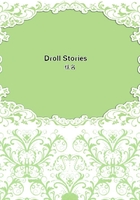
第128章
Certain persons have interrogated the author as to why there was such a demand for these tales that no year passes without his giving an instalment of them, and why he has lately taken to writing commas mixed up with bad syllables, at which the ladies publicly knit their brows, and have put to him other questions of a like character.
The author declares that these treacherous words, cast like pebbles in his path, have touched him in the very depths of his heart, and he is sufficiently cognisant of his duty not to fail to give to his special audience in this prologue certain reasons other than the preceding ones, because it is always necessary to reason with children until they are grown up, understand things, and hold their tongues; and because he perceives many mischievous fellows among the crowd of noisy people, who ignore at pleasure the real object of these volumes.
In the first place know, that if certain virtuous ladies--I say virtuous because common and low class women do not read these stories, preferring those that are never published; on the contrary, other citizens' wives and ladies, of high respectability and godliness, although doubtless disgusted with the subject-matter, read them piously to satisfy an evil spirit, and thus keep themselves virtuous.
Do you understand, my good reapers of horns? It is better to be deceived by the tale of a book than cuckolded through the story of a gentleman. You are saved the damage by this, poor fools! besides which, often your lady becomes enamoured, is seized with fecund agitations to your advantage, raised in her by the present book.
Therefore do these volumes assist to populate the land and maintain it in mirth, honour and health. I say mirth, because much is to be derived from these tales. I say honour, because you save your nest from the claws of that youthful demon named cuckoldom in the language of the Celts. I say health, because this book incites that which was prescribed by the Church of Salerno, for the avoidance of cerebral plethora. Can you derive a like proof in any other typographically blackened portfolios? Ha! ha! where are the books that make children?
Think! Nowhere. But you will find a glut of children making books which beget nothing but weariness.
But to continue. Now be it known that when ladies, of a virtuous nature and a talkative turn of mind, converse publicly on the subject of these volumes, a great number of them, far from reprimanding the author, confess that they like him very much, esteem him a valiant man, worthy to be a monk in the Abbey of Theleme. For as many reasons as there are stars in the heavens, he does not drop the style which he has adopted in these said tales, but lets himself be vituperated, and keeps steadily on his way, because noble France is a woman who refuses to yield, crying, twisting about, and saying, "No, no, never! Oh, sir, what are you going to do? I won't let you; you'd rumple me."
And when the volume is done and finished, all smiles, she exclaims, "Oh, master, are there any more to come?"
You may take it for granted that the author is a merry fellow, who troubles himself little about the cries, tears and tricks of the lady you call glory, fashion, or public favour, for he knows her to be a wanton who would put up with any violence. He knows that in France her war-cry is, Mount Joy! A fine cry indeed, but one which certain writers have disfigured, and which signifies, "Joy it is not of the earth, it is there; seize it, otherwise good-bye." The author has this interpretation from Rabelais, who told it to him. If you search history, has France ever breathed a word when she was joyous mounted, bravely mounted, passionately mounted, mounted and out of breath? She goes furiously at everything, and likes this exercise better than drinking. Now, do you not see that these volumes are French, joyfully French, wildly French, French before, French behind, French to the backbone. Back then, curs! strike up the music; silence, bigots! advance my merry wags, my little pages, put your soft hands into the ladies' hands and tickle them in the middle--of the hand of course.
Ha! ha! these are high sounding and peripatetic reasons, or the author knows nothing of sound and the philosophy of Aristotle. He has on his side the crown of France and the oriflamme of the king and Monsieur St. Denis, who, having lost his head, said "Mount-my-Joy!" Do you mean to say, you quadrupeds, that the word is wrong? No. It was certainly heard by a great many people at the time; but in these days of deep wretchedness you believe nothing concerning the good old saints.